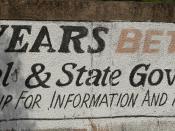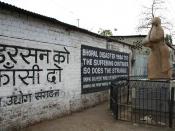The U.S. based Union Carbide Corporation is the parent company to UCIL. Union Carbide Corporation (UCC) owned 50.9% of the equity of Union Carbide of India, Limited (UCIL), and maintained extensive corporate, managerial, technical and operational control over UCIL. Despite that, since the leak UCC has argued that the Bhopal plant was not under its control or management, and that UCIL was responsible, prior to the leak. The company decided to store quantities of the "ultra-hazardous" MIC in the Bhopal plant in bulk, but did not equip the plant with the corresponding processing or safety capacity. On the night of the gas leak crucial safety systems were not functional. UCC transferred technology that was not proven and entailed operational risks. It did not apply the same standards of safety in design or operations to Bhopal as it had in place in the USA. Most importantly for those who lived and worked around the plant, and unlike in the USA, the company failed to set up any comprehensive emergency plan or system in Bhopal to warn local communities about leaks.
As early as in 1982, a UCC safety audit had highlighted many major and minor safety concerns regarding the Bhopal plant. There had been a number of accidents at the plant prior to the leak and local media and the workers' union had repeatedly raised safety concerns in public. Months before the December 1984 disaster, the UCC was warned of the possibility of a runaway reaction. After the leak, UCC maintained that MIC was nothing more than tear gas even though the company's own manuals clearly said that MIC was a fatal poison. Till date UCC has refused to identify the reaction products released and related toxicological information of the products that leaked. This has prevented doctors...


